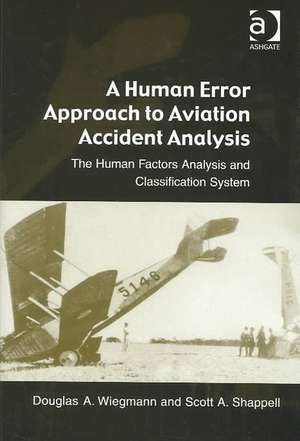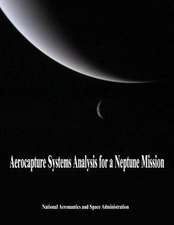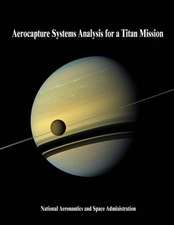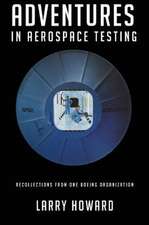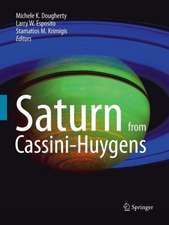A Human Error Approach to Aviation Accident Analysis: The Human Factors Analysis and Classification System
Autor Douglas A. Wiegmann, Scott A. Shappellen Limba Engleză Hardback – 18 iul 2003
| Toate formatele și edițiile | Preț | Express |
|---|---|---|
| Paperback (1) | 355.03 lei 3-5 săpt. | +16.79 lei 7-11 zile |
| CRC Press – 18 iul 2003 | 355.03 lei 3-5 săpt. | +16.79 lei 7-11 zile |
| Hardback (1) | 1110.11 lei 6-8 săpt. | |
| CRC Press – 18 iul 2003 | 1110.11 lei 6-8 săpt. |
Preț: 1110.11 lei
Preț vechi: 1353.80 lei
-18% Nou
Puncte Express: 1665
Preț estimativ în valută:
212.41€ • 221.80$ • 175.41£
212.41€ • 221.80$ • 175.41£
Carte tipărită la comandă
Livrare economică 15-29 aprilie
Preluare comenzi: 021 569.72.76
Specificații
ISBN-13: 9780754618751
ISBN-10: 0754618757
Pagini: 184
Dimensiuni: 156 x 234 x 13 mm
Greutate: 0.48 kg
Ediția:1
Editura: CRC Press
Colecția Routledge
ISBN-10: 0754618757
Pagini: 184
Dimensiuni: 156 x 234 x 13 mm
Greutate: 0.48 kg
Ediția:1
Editura: CRC Press
Colecția Routledge
Cuprins
Contents: Errare Humanum Est - to err is human; Human error perspectives; The human factors analysis and classification system (HFACS); Aviation case studies using HFACS; Exposing the face of human error; Beyond gut feelings...; But what about...?; References; Index.
Notă biografică
Dr. Shappell is an internationally renowned expert and a highly sought after consultant and speaker in the fields of human factors, systems safety, error management, and accident investigation. He formerly served as Human Factors Branch Chief at the U.S. Naval Safety Center and as a human factors accident investigation consultant for the Joint Service Safety Chiefs. Prior to the Naval Safety Center, he served as the Force Aerospace Psychologist for the Commander, Naval Air Forces, U.S. Atlantic Fleet. His work experiences also include serving as the Human Factors Research Branch Manager at the Civil Aerospace Medical Institute of the Federal Aviation Administration in Oklahoma City, OK. He has published over 50 papers in the fields of human error analysis and accident investigation, workplace injuries, and fatigue. Dr. Douglas A. Wiegmann is a tenured professor in the Department of Human Factors at the University of Illinois in Urbana-Champaign. He is an internationally recognized expert in the fields of human error analysis and accident investigation, and has formerly served as an aviation psychologist for the U.S. Navy and an accident investigator for the U.S. National Transportation Safety Board (NTSB). Dr. Wiegmann was the official human factors consultant to the U.S. Department of Energy during the investigation of the August 2003 blackout and consultant to the Columbia Accident Investigation Board during their analysis of the causes underlying the crash of the NASA space shuttle. He is a board certified human factors professional and the past-president of the Aerospace Human Factors Association.
Recenzii
'Bridging the gap between system safety theory and practice, this book provides a clear, comprehensive, field-tested framework to assist aviation safety professionals with investigating, analyzing, and assessing the impact of human error in aviation accidents and incidents. A 'must-read' for all interested in causal factor analysis!' Dr. James T. Luxhøj, Rutgers University, USA '...it is the training in human error analysis using HFACS that has enabled our Naval Flight Surgeons to serve as the human factors experts...' Captain James R. Fraser, M.D., Command Surgeon, Naval Safety Center, Norfolk, Virginia. 'This book is essential reading for all safety professionals, investigators and analysts. Time tested results of aircraft mishap analysis reveal that 80% of all mishaps have human factors as a significant contributing causal factor. These diverse factors have been identified but until now have been difficult to classify in a simple schema that could be used by operators, investigators or human error professionals. This sentinel work, that Dr's Wiegmann and Shappell have generated based upon Reason's model for human error, now provides an elegant tool for not only analysis and classification of the disparate data elements but also provides a frame work to build our intervention strategies around.' Captain Nicholas Webster, MD, MPH, Aeromedical Safety Professional '...the book should be required reading for any journalist expected to cover air accidents. ...it contains a wealth of insight and it will be a useful addition to the bookshelf of anyone with an interest in aviation safety. ' Navigation News Jan 04 'This is a seriously informative and provocative text which deserves a wide readership among all aviation safety professionals and concerned individuals and organisations in the military forces and general travelling public.' Occupational Safety & Health, April 2004
Descriere
This comprehensive book provides the knowledge and tools required to conduct a human error analysis of accidents. Serving as an excellent reference guide for many safety professionals and investigators already in the field.
